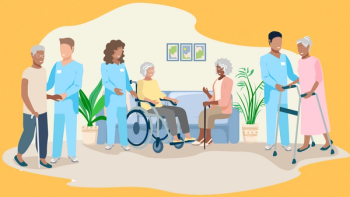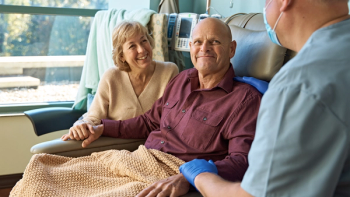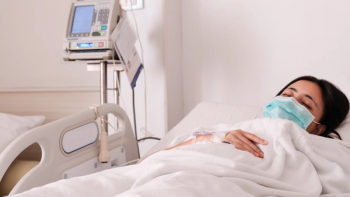
Experts with the Society for Integrative Oncology and the American Society of Clinical Oncology recommend mindfulness-based interventions to help patients with cancer manage anxiety and depression symptoms.

Experts with the Society for Integrative Oncology and the American Society of Clinical Oncology recommend mindfulness-based interventions to help patients with cancer manage anxiety and depression symptoms.

Jennifer Cargile, MEd, CCC-SLP, shares some signs and symptoms of cancer-related cognitive impairment that the oncology nurse should be looking out for.

Oncology nurses across the country are spearheading initiatives to improve education, attitudes, and access surrounding palliative care.

Leana Cabrera Chien, MSN, RN, GCNS-BC, GNP-BC; and William Dale, MD, PD, discuss the new ASCO geriatric assessment guidelines and what they mean for nurses.

Linda Bloom, MPA, RN, OCN, highlights how tools such as audio interpretation technology and clear masks can help nurses and patients overcome communication barriers in oncology.

A single-arm study pilot study showed that patients' well-being scores significantly improved with the introduction of aromatherapy.

Leana Cabrera Chien, MSN, RN, GCNS-BC, GNP-BC, and William Dale, MD, PhD, discuss why geriatric assessments are important in providing individualized care.

Patients about to undergo Mohs microscopic surgery reported that they were more likely to request over-the-counter medications if they perceived their risk of opioid addiction to be high.

An update to the American Society of Clinical Oncology guidelines state that all patients with cancer who are older than 65 years should receive a geriatric assessment.

Patients who listen to music while receiving chemotherapy may experience lower levels of distress.

On-pathway regimens are associated with lower costs, and slightly higher emergency department visits and adverse event rates in cancer care.

Iris app aims to leverage accessible technology to deliver supportive care to all patients with cancer.

Arletta Jackson, RN, MSN, explains the concept of patient-centric infusion and how it benefits both nurses and patients.

Darcy Burbage, DNP, RN, AOCN, CBCN, shares which presentations from the 2023 ASCO Annual Meeting she found most important for oncology nurses.

Patients with breast and gastrointestinal cancers reported fewer hand-foot syndrome events following treatment with topical diclofenac gel.

Amanda McKaig, BSN-RN, OCN; and Alyssa Ridad, BSN-RN, OCN, discuss how Ryan’s Law has changed their practice and how oncology nurses have responded to the changes.

According to investigators, digitized cognitive behavioral stress management may help clinicians offer more comprehensive cancer care.

Applying weighted blankets for 20 minutes reduced patient anxiety during cancer infusions.

Alyssa Ridad BSN-RN, OCN; and Amanda McKaig, BSN, RN, OCN, discuss oncology nurse perceptions of medical cannabis.

Oncology nurse investigators from Dana-Farber discuss the value of weighted blankets in reducing patient anxiety during infusions.

Elizabeth R. Cullen, MSN, ARNP, highlights the efficacy of avasopasem manganese in mitigating severe oral mucositis in patients with locally advanced head and neck cancer.

Victoria R. Crowder, BSN, RN, and co-investigators, highlight existing gaps in the understanding of malnutrition risks facing patients with acute myeloid leukemia and myelodysplastic syndromes.

Ashley Marenyi, RN, BSN, OCN, highlights the importance of counseling patients with head and neck cancer on the short-term and long-term adverse effects of radiation treatment.

Denise Nicholson, BSN, RN, explains the importance of advance care planning, and how oncology nurses can effectively facilitate these conversations.

Omidubicel has been approved to quicken the recovery of neutrophils and reduce the risk of infection following stem cell transplant.

Early coordination with multiple specialty teams can maximize outcomes and improve quality of life for patients with complex metastatic disease.

An oncology nurse initiative increased the rate of end-of-life discussions in patients with advanced cancer.

Patients with unresectable pancreatic cancers and cholangiocarcinoma face poor prognoses, but systemic treatment continues to evolve.

Olanzapine demonstrated efficacy in improving appetite and weight gain in patients receiving cytotoxic chemotherapies.

Pure essential oils reduced the severity of chemotherapy-induced nausea and vomiting in patients receiving autologous blood and marrow transplants.